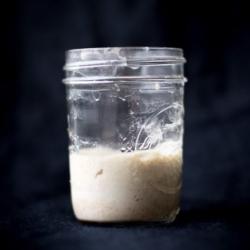Source Institutions
Source Institutions
Add to list Go to activity
Activity link broken? See if it's at the internet archive

In this activity, learners explore chemistry and the microbial world by making their own sourdough starter and bread at home using only flour and water. Learners also have the option to take part in a citizen science experiment by collecting and sharing data from the 10-day sourdough starter making process with the Rob Dunn Lab at NC State University. There are still many mysteries about the microbial world, and the Rob Dunn lab is interested in participants findings from creating sourdough, or sibling sourdoughs at home. Activity includes instructions, a video introduction, a sourdough recipe, background information on the nature of the experiment, and an explanation of how making sourdough at home can help the scientific community.
- 30 to 45 minutes
- 1 to 7 days
- $1 - $5 per student
- Ages 6 - adult
- Activity, Experiment/Lab Activity
- English
Quick Guide
Materials List (per student)
- Mason jar or other glass jar
- Cloth or paper napkins to use as jar covers
- Rubberband
- Ruler
- Measuring spoons
- Spoon for mixing
- Flour (Any type you like! Rye, whole wheat, all-purpose, etc.)
- Dechlorinated water (filtered water or tap water that has been left in a clear glass overnight)
Subjects
-
Mathematics
-
Data Analysis and Probability
- Data Collection
-
Data Analysis and Probability
-
Physical Sciences
-
Chemistry
- Chemical Reactions
- Acids and Bases
-
Chemistry
-
The Nature of Science
-
The Scientific Process
- Conducting Investigations
- Gathering Data
- Communicating Results
-
The Scientific Process
Informal Categories
- Citizen Science
- Food and Cooking
Other
Components that are part of this resource:
- About the Experiment
- Video Introduction
- How To Characterize Your Sourdough Starter (Citizen Science)
- Educator Resource Guide
Access Rights:
- Free access
By:
Rights:
- All rights reserved, North Carolina State University, 2020
Funding Source:
- North Carolina State University
